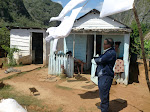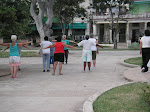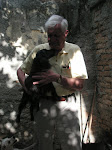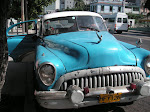Tropical Storms
Like an unfavorite cousin, Isaac threatened to blow into town earlier this week, and about a day ahead of his expected arrival, he changed his mind and changed course for New Orleans. We heaved a sigh of relief and thought for a minute of the poor New Orleaners sitting there below sea level with only 14 billion dollars worth of new pumps and dikes to protect them from another Katrina disaster. Probably few of us thought of the people who live along hundreds of miles of Cuba's north coast which closely parallels Isaac's track through the Florida Straits.
Well, there is some reason to worry more about New Orleans than Cuba. It's because Cuba has a hurricane protection plan that works, as has been proven time and time again. They evacuate everyone in advance of a storm, and this includes sick, elderly, bedridden, and everyday citizens. This isn't just a sheriff's deputy knocking on your door to tell you the Governor says you should leave. In Cuba it is regular radio broadcasts, arranged transportation, established shelters in reinforced buildings and lots of advance planning. In Cuba there are no gridlocked highways full of frightened fleeing people stalled in the rain and blowing their horns. Only a small fraction of Cubans even own a car. The preplanned busses that everyone must take are there, and their capacity matches the number assigned to them.
Of course here in the US, the Governor can't really tell me to do anything unless I've committed a crime or he has declared martial law, so we always have a certain number of dauntless adventurers who "ride it out" hunkering down at home with varying results. They can get off scot-free and comfortably if the electricity and gas service holds out, or they can lose the gamble and lose power, their house, or their lives in ascending order of importance.
Someone once said the best defense against a hurricane is not to be there when it arrives, and that's the sage advice upon which the Cuban plan is based. They say "go," and you "go." You can do those things in a strong man style government. And to give them their due, since 2001 only 35 Cubans have died in 16 named storms. Compare this with 1836 people dead just in Katrina's 2005 visit to New Orleans.
So we can all agree that as admirable as Cuba's record is in protecting its population from tropical storms, it comes at least partially from the iron grip its leaders have on power and from their control over individual freedoms. It's hard to imagine such power ever being wielded here in the USA.
Considering our different style of governing, I think future US performance in combating storms will be pretty much like our past record: a few lives lost in direct hits and near misses and the occasional Katrina- like disaster when we become lax in flood protection or building codes or evacuation plans or shelter availability.
One hopeful trend I've noticed here in recent years is provision for household pets in public storm shelters. This was completely ignored in the past, but today many shelters have such capability. It's a good thing when you consider that many people think of their companion animals as family members. Really dedicated pet owners would no sooner leave their dog or cat at home to ride it out while they evacuate than they would leave their first born son. Our family is in that category, and you should see us when we evacuate.
We have to rent a large SUV as neither of our cars are big enough for 2 dogs, 6 cats in cages, 2 people, and our necessities for a few days., Preparing all this takes a couple of extra days which injects us into an even more iffy "cone of uncertainty." More than once we have found ourselves 200 miles from home, holed up in a motel, and walking the dogs in the rain while the storm turned, followed us, and the weather back home never got worse than slightly breezy with a light rain.
Les Inglis
Friday, August 31, 2012
Subscribe to:
Post Comments (Atom)






























































































No comments:
Post a Comment